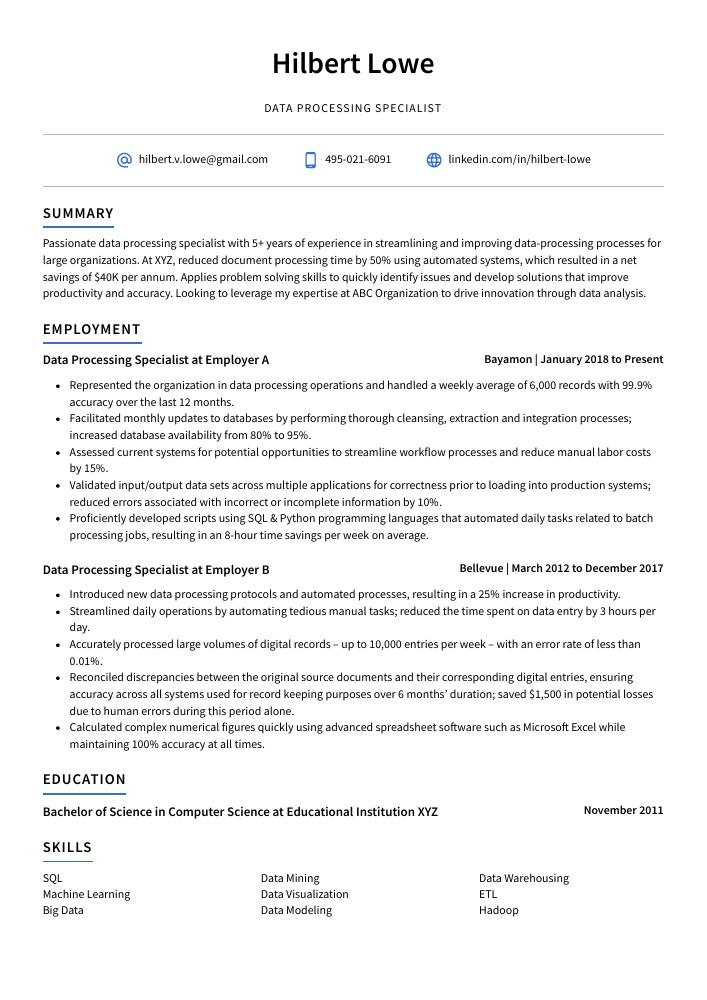Data Processing Specialist Resume Guide
Data processing specialists collect, organize and analyze data from various sources. They use computer software to help them store, manipulate and interpret the data for reports or presentations that can be used by business owners or other professionals.
Data processing is your specialty, and you know how to make any database run smoothly. To show hiring managers that you’re the right fit for their team, writing a resume with all of your qualifications must be done.
This guide will walk you through the entire process of creating a top-notch resume. We first show you a complete example and then break down what each resume section should look like.
Table of Contents
The guide is divided into sections for your convenience. You can read it from beginning to end or use the table of contents below to jump to a specific part.
Data Processing Specialist Resume Sample
Hilbert Lowe
Data Processing Specialist
[email protected]
495-021-6091
linkedin.com/in/hilbert-lowe
Summary
Passionate data processing specialist with 5+ years of experience in streamlining and improving data-processing processes for large organizations. At XYZ, reduced document processing time by 50% using automated systems, which resulted in a net savings of $40K per annum. Applies problem solving skills to quickly identify issues and develop solutions that improve productivity and accuracy. Looking to leverage my expertise at ABC Organization to drive innovation through data analysis.
Experience
Data Processing Specialist, Employer A
Bayamon, Jan 2018 – Present
- Represented the organization in data processing operations and handled a weekly average of 6,000 records with 99.9% accuracy over the last 12 months.
- Facilitated monthly updates to databases by performing thorough cleansing, extraction and integration processes; increased database availability from 80% to 95%.
- Assessed current systems for potential opportunities to streamline workflow processes and reduce manual labor costs by 15%.
- Validated input/output data sets across multiple applications for correctness prior to loading into production systems; reduced errors associated with incorrect or incomplete information by 10%.
- Proficiently developed scripts using SQL & Python programming languages that automated daily tasks related to batch processing jobs, resulting in an 8-hour time savings per week on average.
Data Processing Specialist, Employer B
Bellevue, Mar 2012 – Dec 2017
- Introduced new data processing protocols and automated processes, resulting in a 25% increase in productivity.
- Streamlined daily operations by automating tedious manual tasks; reduced the time spent on data entry by 3 hours per day.
- Accurately processed large volumes of digital records – up to 10,000 entries per week – with an error rate of less than 0.01%.
- Reconciled discrepancies between the original source documents and their corresponding digital entries, ensuring accuracy across all systems used for record keeping purposes over 6 months’ duration; saved $1,500 in potential losses due to human errors during this period alone.
- Calculated complex numerical figures quickly using advanced spreadsheet software such as Microsoft Excel while maintaining 100% accuracy at all times.
Skills
- SQL
- Data Mining
- Data Warehousing
- Machine Learning
- Data Visualization
- ETL
- Big Data
- Data Modeling
- Hadoop
Education
Bachelor of Science in Computer Science
Educational Institution XYZ
Nov 2011
Certifications
Certified Data Processing Technician
International Association of Computer Information Systems
May 2017
1. Summary / Objective
The summary/objective at the beginning of your data processing specialist resume should be an attention-grabbing introduction to who you are and why you excel in this role. Include key skills such as database management, scripting languages, or software development that make you a great fit for the job. You could also mention any certifications or awards related to data processing that demonstrate your expertise. Finally, include specific examples of how you have used these skills successfully in past roles.
Below are some resume summary examples:
Diligent and organized Data Processing Specialist with 7+ years of experience driving data accuracy and integrity for organizations. At XYZ, maintained up-to-date records for 30 departments, ensuring compliance with federal regulations. Proactively identified errors in spreadsheets that resulted in a cost savings of $15K/year. Adept at analyzing large amounts of data to identify trends and develop solutions to improve operations efficiency.
Enthusiastic data processing specialist with 5+ years of experience in transforming raw data into meaningful information to support company decision making. Proven success in creating automated processes and workflows that significantly improved accuracy, efficiency, and productivity. Looking for an opportunity at ABC where I can use my skills to help analyze customer trends and develop insights from large datasets.
Accomplished data processing specialist with 5+ years of experience in the industry. Adept at quickly gathering, organizing and analyzing large datasets to uncover actionable insights for businesses. Proven track record of developing streamlined data-processing procedures that improve efficiency by up to 33%. Seeking a role where I can leverage my skillset and drive meaningful results at ABC Corporation.
Detail-oriented data processing specialist with 8+ years of experience in data entry, processing and analysis. Proven track record of managing large datasets while adhering to strict deadlines. Skilled at using Microsoft Excel, Access and SQL for data manipulation tasks. At XYZ Corporation, achieved a 95% accuracy rate on all processed data due to rigorous quality assurance standards implemented by me.
Well-rounded data processing specialist with 7+ years of experience in data entry, database management, and process optimization. Proven track record of transforming raw data into meaningful information for decision-making purposes. Seeking to join ABC Company to leverage expertise in developing efficient processes that reduce costs while improving accuracy and speed of operations.
Proficient data processing specialist with 5+ years of experience in streamlining data input and output processes. Skilled at designing efficient databases, implementing automated systems for large-scale data entry projects, and managing complex datasets. Looking to leverage expertise in modernizing ABC’s process management system for improved efficiency and accuracy.
Energetic data processing specialist with a proven track record of accurately compiling, verifying, and analyzing data from multiple sources. At XYZ Co., reduced the average time to process customer orders by 50%, leading to improved customer satisfaction ratings. Experienced in using SQL queries and software tools such as Microsoft Excel for data analysis.
Professional data processing specialist with 5+ years of experience in verifying, validating and maintaining high-volume data for large organizations. Expertise in utilizing software tools to automate processes and improve accuracy. Looking to apply my knowledge at ABC Corp., where I can help optimize the workflow while meeting tight deadlines.
2. Experience / Employment
The employment (or experience) section is where you talk about your work history. It should be written in reverse chronological order, meaning that the most recent job is listed first.
Stick to bullet points when writing this section; doing so makes it easier for the reader to take in all of the information quickly and efficiently. Be sure to provide detail on what you did and any results or outcomes achieved from your efforts.
For example, instead of saying “Processed data,” you could say, “Reduced manual data entry time by 40% through automation using Python scripts.”
To write effective bullet points, begin with a strong verb or adverb. Industry specific verbs to use are:
- Processed
- Analyzed
- Compiled
- Calculated
- Organized
- Monitored
- Recorded
- Updated
- Researched
- Generated
- Interpreted
- Validated
- Reconciled
- Assessed
Other general verbs you can use are:
- Achieved
- Advised
- Coordinated
- Demonstrated
- Developed
- Expedited
- Facilitated
- Formulated
- Improved
- Introduced
- Mentored
- Optimized
- Participated
- Prepared
- Presented
- Reduced
- Reorganized
- Represented
- Revised
- Spearheaded
- Streamlined
- Structured
- Utilized
Below are some example bullet points:
- Coordinated and managed the data processing needs of 15+ clients, ensuring accuracy and timely completion of all tasks within a 6-hour delivery window.
- Developed automated processes to streamline existing manual operations; reduced time spent on data entry by 40% while increasing overall quality standards.
- Reliably executed over 1,000 daily records transactions with an average accuracy rate of 98%.
- Reorganized massive databases and archives containing sensitive client information in order to improve usability and access control; improved search engine performance by 30%.
- Presented comprehensive monthly reports detailing project progress for executive review, resulting in improved customer satisfaction ratings from 88% to 92%.
- Processed high volumes of data accurately and efficiently, utilizing a range of complex software applications to perform daily duties; reduced processing time by an average of 40% within first 6 months.
- Expedited data entry procedures by creating automated scripts for repetitive tasks, increasing overall productivity by 55%.
- Independently managed the extraction and analysis of large datasets from multiple sources to identify underlying trends in customer behavior; identified potential areas for cost savings totaling $20,000 annually.
- Generated comprehensive reports on various aspects of the business operations based on collected information, enabling strategic decision-making across departments with improved accuracy levels (99%).
- Mentored junior colleagues in basic database management techniques while ensuring that they adhered strictly to company policies related to data protection and privacy regulations; trained 7 new hires over a period of 2 years successfully.
- Spearheaded the development of an automated data processing system that increased work efficiency by 25% and saved over $10,000 in costs.
- Optimized existing database storage processes to reduce redundancy and free up 40GB of space on the company’s servers.
- Recorded detailed reports on various data processing tasks, ensuring accuracy throughout all stages and project timelines were met with no delays or errors.
- Formulated complex queries using SQL commands to update customer records quickly in response to changing business needs; reduced query time from 2 hours down to 20 minutes per record set changes made within a year timeframe.
- Effectively managed 6 team members who developed software applications for managing large data sets; completed projects ahead of deadlines without sacrificing quality assurance standards.
- Updated and maintained databases of over 1,000 customer records and processed 500+ transactions per day with 99.9% accuracy.
- Organized and validated incoming data from multiple sources; successfully eliminated duplicates in the database by 98%.
- Demonstrated expertise in using various software packages to process large volumes of data quickly while ensuring accuracy and completeness; reduced processing time by 20%.
- Compiled weekly, monthly & quarterly reports on data trends for management review; provided insights leading to cost savings of $6,500 last financial year.
- Substantially improved efficiency across all departments through streamlining existing processes related to storage/retrieval/management of information systems – improved speed-to-market by 25%.
- Thoroughly processed, verified and validated over 5,000 data entries daily, ensuring accuracy of all information before submission.
- Utilized Microsoft Access to store & manage large-scale databases; improved query time by 60% while maintaining 99% accuracy in records.
- Monitored the progress of each project closely to ensure timely completion within set deadlines; completed 4 projects ahead of schedule with zero errors reported.
- Reduced manual inputting requirements by 50%, utilizing automated processes such as macros and scripts whenever possible for greater efficiency & productivity levels.
- Revised existing database models on a quarterly basis according to customer feedbacks and changing business needs; enhanced overall system performance by 20%.
- Advised the executive team on data processing strategies, resulting in a 35% decrease in manual input errors.
- Interpreted various digital formats and structured large datasets for reporting purposes; completed 20+ projects within 2 weeks of their deadlines.
- Structured complex databases to ensure accuracy in storing and retrieving information; increased efficiency by 30%.
- Achieved an average daily output of 3 million records with 99% accuracy, surpassing the target rate set by management by 10%.
- Actively monitored system performance to prevent critical errors from occurring while performing regular maintenance tasks; reduced downtime incidents by 45%.
- Participated in the development and implementation of new data processing systems; improved existing processes by 20%, resulting in increased efficiency and accuracy.
- Prepared reports for management, utilizing stored procedures to process large volumes of structured & unstructured data sets within tight deadlines.
- Researched advanced analytics techniques such as machine learning models & predictive algorithms to optimize data-driven decision making with a 97% success rate.
- Meticulously maintained records on databases containing critical information related to customer accounts, financial transactions and product inventories across multiple industries; reduced manual errors by 50%.
- Automated routine tasks such as indexing documentation, verifying address details & collecting contact info; saved an average of 10 hours per week for colleagues working in other departments.
3. Skills
Two organizations that have advertised for a position with the same title may be searching for individuals whose skills are quite different. For instance, one may be looking for someone who is proficient in Python and another might require knowledge of SQL.
It’s essential to tailor the skills section of your resume to each job that you are applying for, as many employers use applicant tracking systems which scan resumes for certain keywords before passing them on to a human.
In addition, it’s important not only list relevant skills here but also discuss them in more detail elsewhere – such as the summary or experience sections – so that employers can see how they have been applied successfully in past roles.
Below is a list of common skills & terms:
- Big Data
- Data Cleansing
- Data Mining
- Data Modeling
- Data Visualization
- Data Warehousing
- ETL
- Hadoop
- Machine Learning
- SQL
4. Education
Including an education section on your resume will depend on how far along you are in your career. If you just graduated and have no work experience, include the education section below your resume objective. However, if you have significant work experience to showcase, it might be best to omit this part of the resume altogether.
If an education section is included, try to mention courses or subjects related directly to data processing that were taken during college or university studies.
Bachelor of Science in Computer Science
Educational Institution XYZ
Nov 2011
5. Certifications
Certifications demonstrate to potential employers that you have the necessary skills and knowledge required for a specific job. It is important to include any certifications relevant to the position on your resume, as it will give hiring managers an indication of your qualifications and expertise in certain areas.
Additionally, if you have taken professional development courses or actively kept up with industry trends, make sure to mention these items as well – they can be just as valuable when trying to prove yourself worthy of a role.
Certified Data Processing Technician
International Association of Computer Information Systems
May 2017
6. Contact Info
Your name should be the first thing a reader sees when viewing your resume, so ensure its positioning is prominent. Your phone number should be written in the most commonly used format in your country/city/state, and your email address should be professional.
You can also choose to include a link to your LinkedIn profile, personal website, or other online platforms relevant to your industry.
Finally, name your resume file appropriately to help hiring managers; for Hilbert Lowe, this would be Hilbert-Lowe-resume.pdf or Hilbert-Lowe-resume.docx.
7. Cover Letter
Writing a cover letter is a great way to demonstrate your enthusiasm for the job you are applying for. This document should be separate from your resume and contain 2 to 4 paragraphs about why you believe you would be an excellent fit for the role.
Cover letters allow recruiters to gain a better understanding of who you are as a professional, so writing one can certainly give your application an edge over other candidates. Even if it isn’t required, taking the time to write one will only benefit your chances of success!
Below is an example cover letter:
Dear Felicity,
I am writing to apply for the Data Processing Specialist position with your company. With experience in data entry, analysis, and quality control, I am confident I would make a valuable contribution to your team.
In my current role as a Data Processor at [company name], I am responsible for verifying and entering customer data into our system. I have experience working with various types of data, including financial and medical records. In addition to data entry, I also perform quality control checks to ensure accuracy and completeness of information. My attention to detail ensures that all data is processed correctly before it is used for decision-making purposes.
I also have experience performing basic statistical analyses on collected data sets. This includes identifying trends and relationships between variables. In my previous role as a Research Assistant at [company name], I was responsible for conducting literature reviews, collecting primary research data, and processing survey responses from participants. This work required me to be proficient in using Excel for analyzing quantitative data sets. The skills that I gained from this experience will enable me to effectively contribute to your organization’s success.
I believe that my skills and experiences make me an ideal candidate for the Data Processing Specialist position at your company. Thank you for your time and consideration; I look forward to hearing from you soon about this exciting opportunity.
Sincerely,
Hilbert
Data Processing Specialist Resume Templates
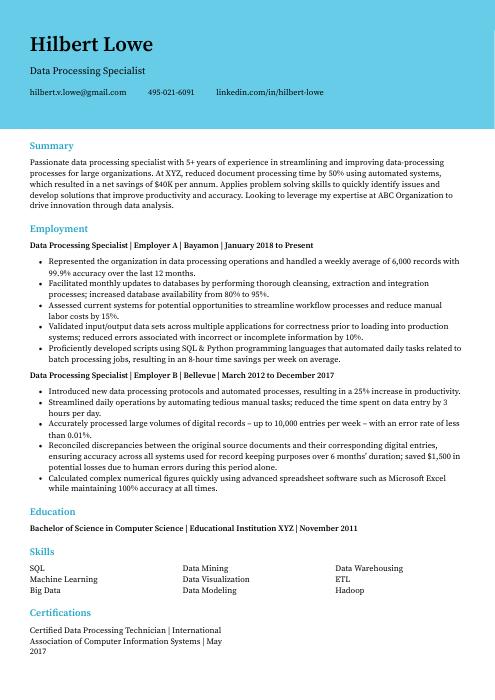 Dugong
Dugong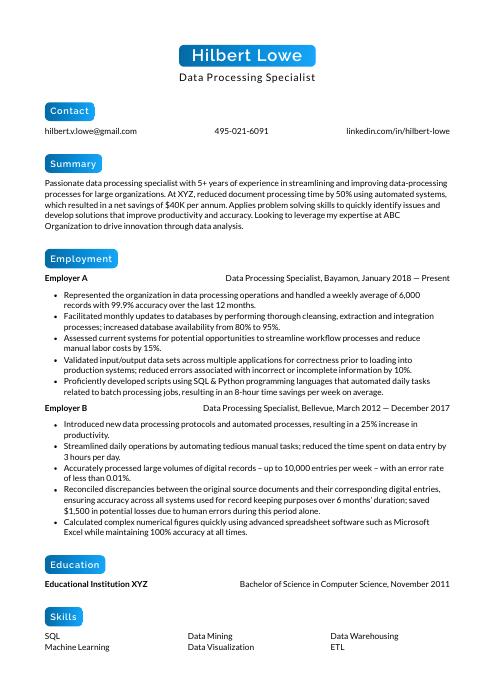 Kinkajou
Kinkajou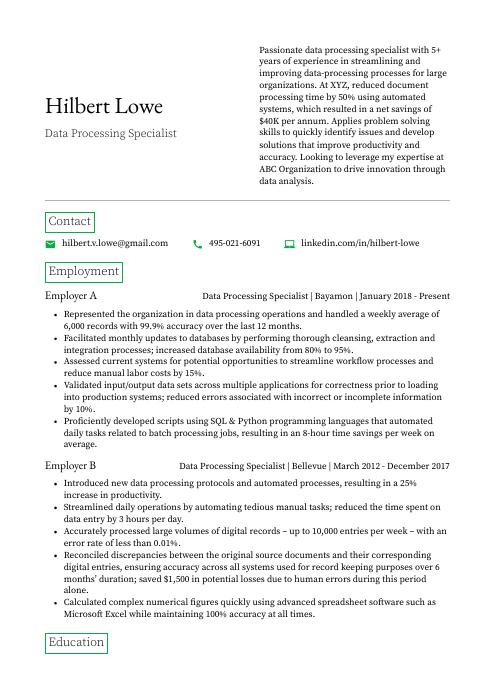 Quokka
Quokka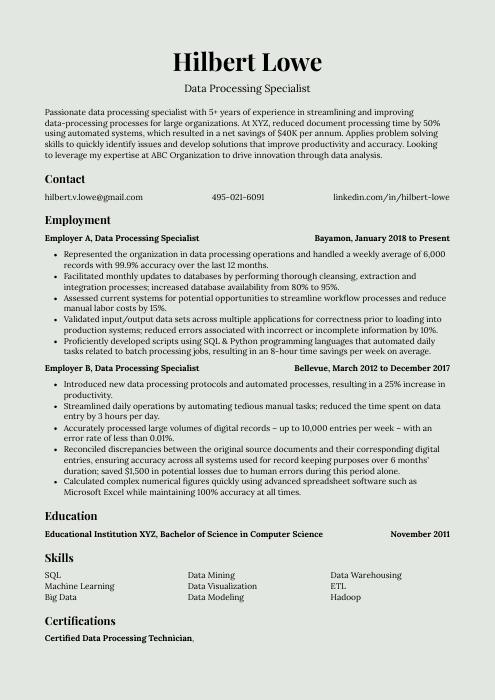 Saola
Saola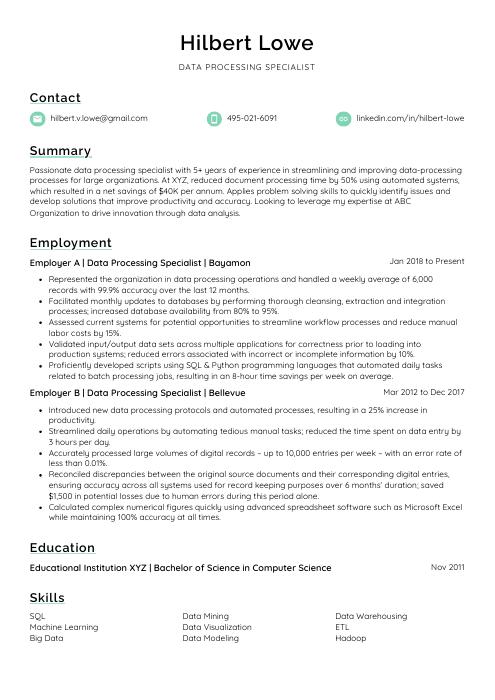 Lorikeet
Lorikeet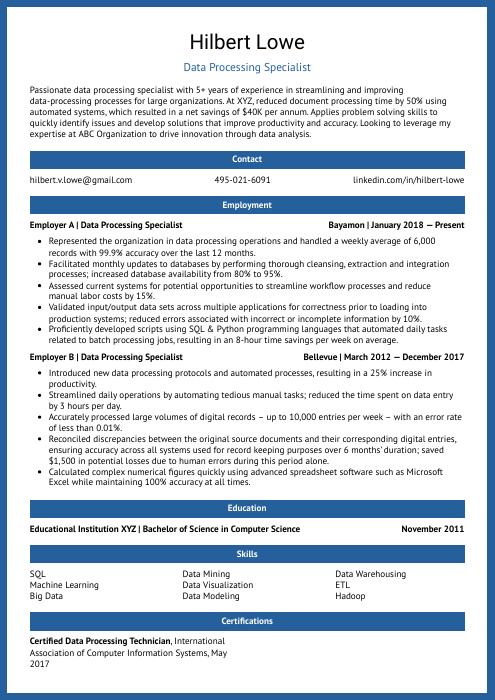 Ocelot
Ocelot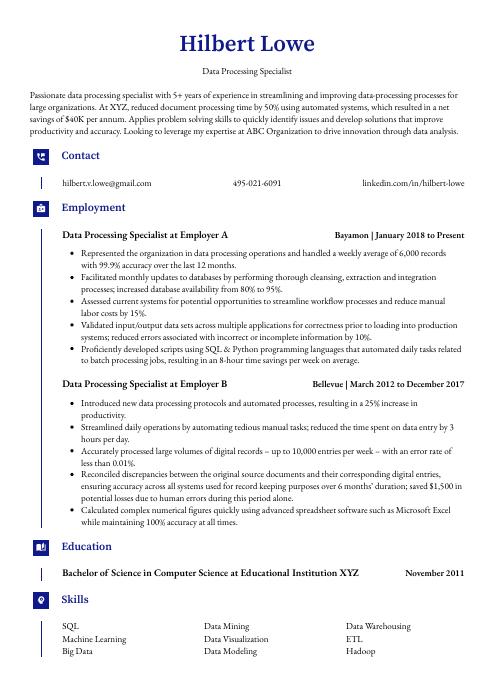 Gharial
Gharial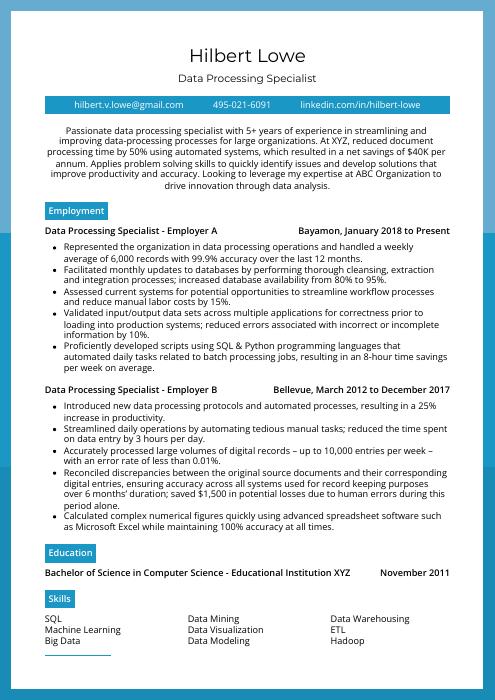 Rhea
Rhea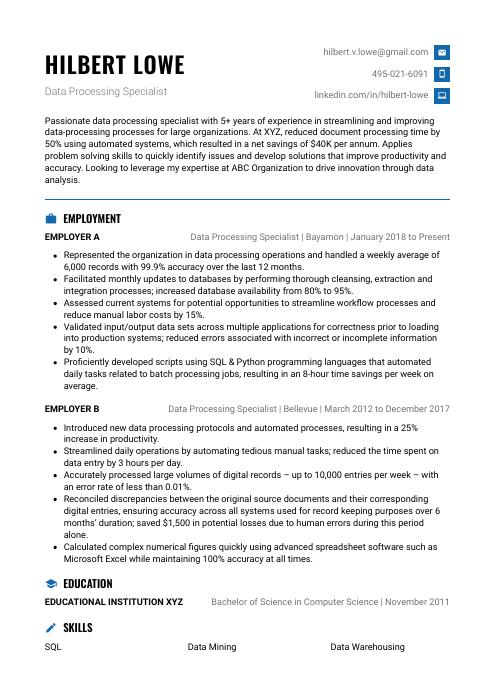 Echidna
Echidna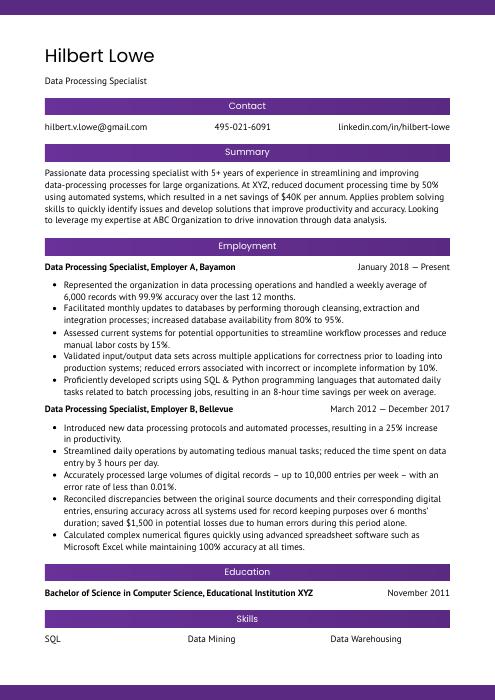 Jerboa
Jerboa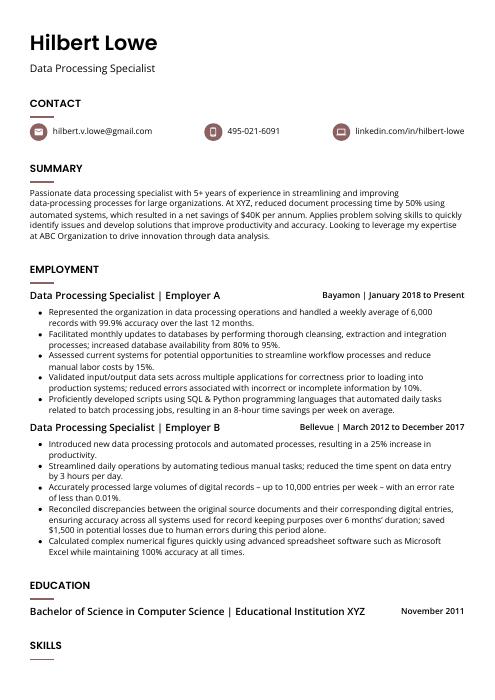 Fossa
Fossa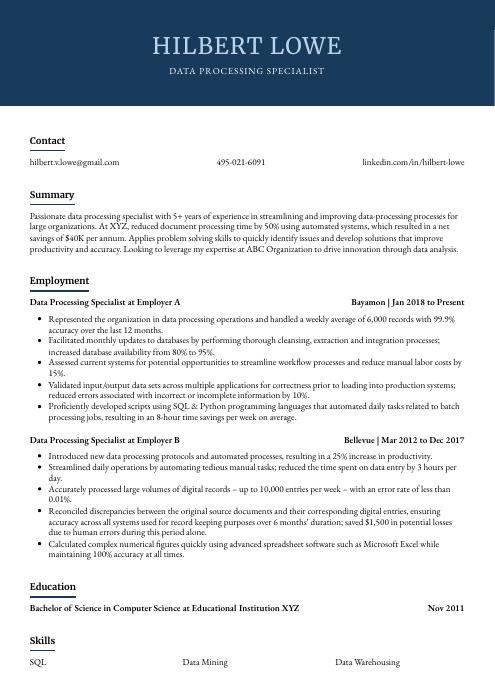 Bonobo
Bonobo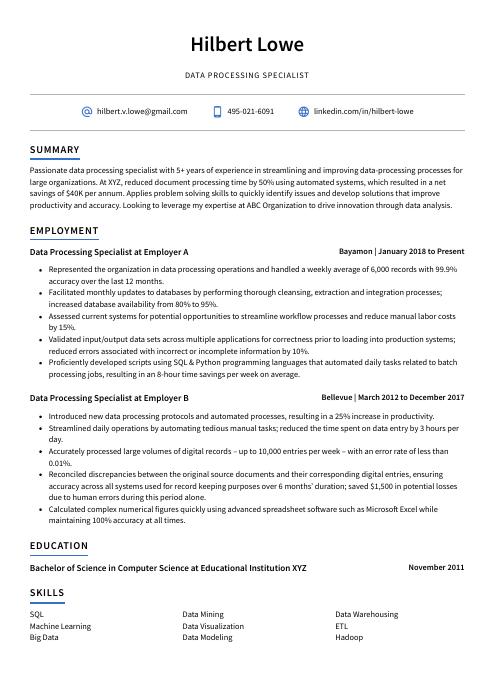 Axolotl
Axolotl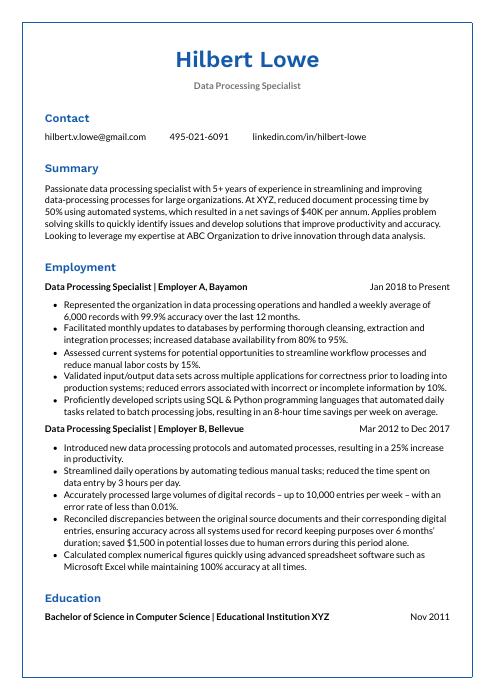 Markhor
Markhor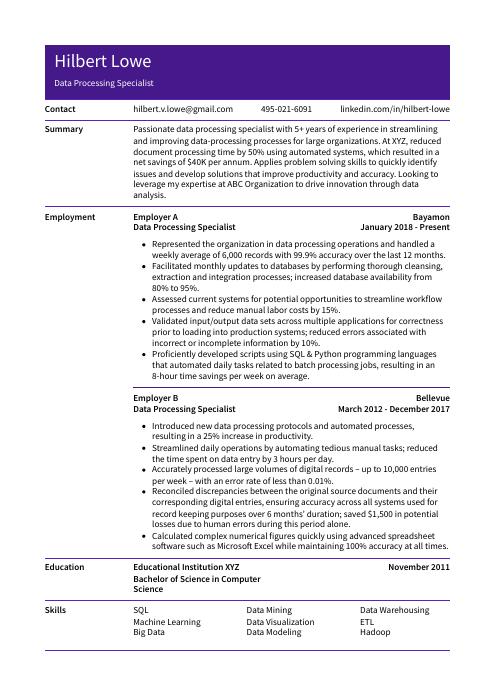 Pika
Pika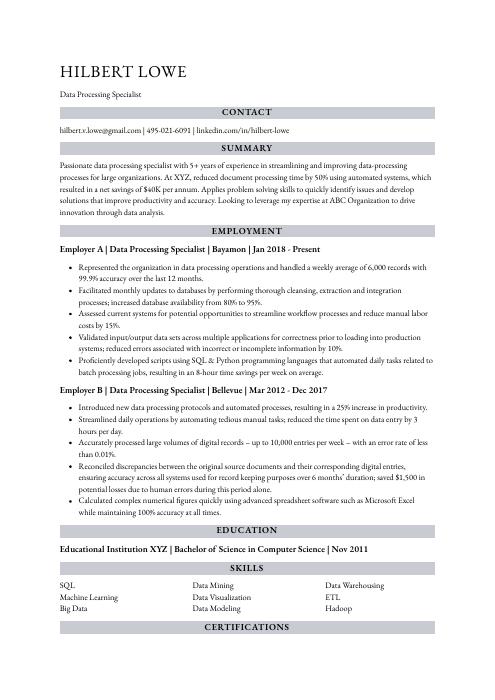 Numbat
Numbat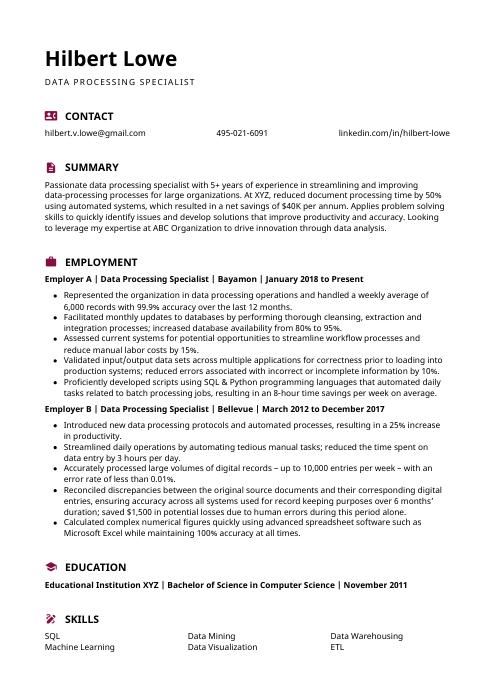 Hoopoe
Hoopoe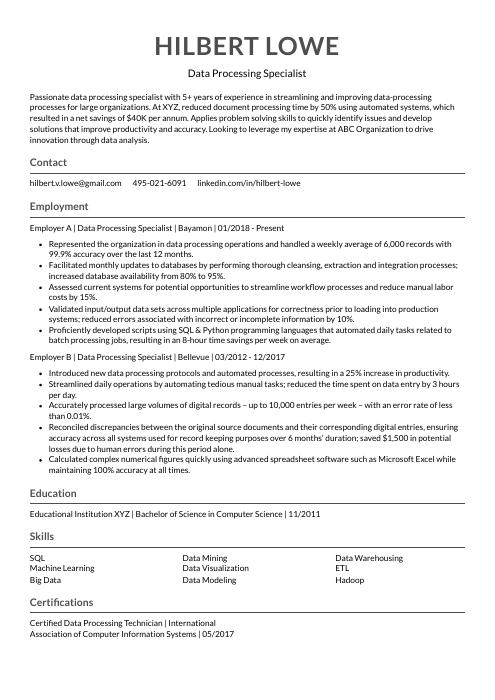 Indri
Indri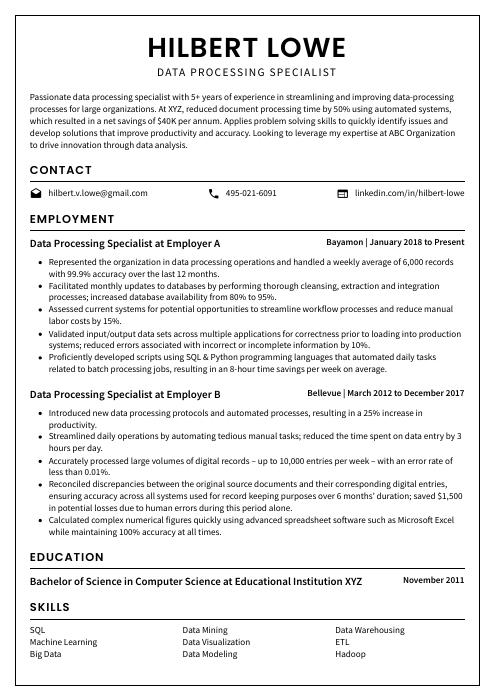 Cormorant
Cormorant Rezjumei
Rezjumei
